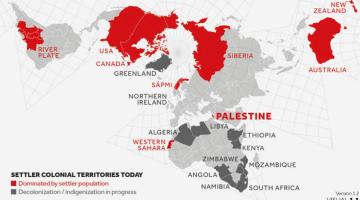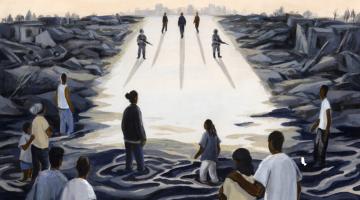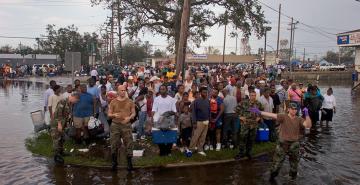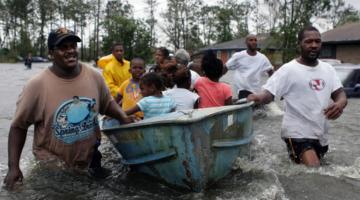A depiction of the 1836 Battle of Constantine in Algeria.
As settler-colonial violence escalates from Kanaky to Palestine, Fanon’s century-old warnings are critical today—capitalism’s genocidal expansion demands revolution.
Originally published in Saïd Bouamama's blog.
The year 2024 marked the centenary of the birth of Amilcar Cabral, a Guinean and Cape Verdean thinker who remains largely unknown for his contributions to national liberation processes and struggles. The year 2025 will mark the centenary of the birth of African-American Malcolm X (May 19), Congolese Patrice Lumumba (July 2), and Martinican and Algerian[1] Frantz Fanon (July 20). These four anniversaries come at a time in history when, from Kanaky to Palestine, via Western Sahara, Polynesia, Mayotte, Bermuda, Puerto Rico, the Virgin Islands, etc., the question of direct colonization remains unresolved. They are taking place above all in a phase of the global imperialist system that is seeing the deployment of new processes of colonization. From Libya to Syria, from Sudan to the Democratic Republic of Congo, balkanization and chaos are being promoted as a strategy for maintaining total dependence, that is, colonization under new guises.
In the same historical sequence, and unsurprisingly, popular movements are developing, rediscovering the concepts, demands, figures, and aspirations of the 1950s to 1970s, which were those of Bandung, armed independence struggles, Pan-African congresses, the Tricontinental Movement, the denunciation of neocolonialism, etc. The aspiration to Bolivarianism in many movements and countries in Latin America, to Pan-Africanism in many African countries, the return of expressions such as “neocolonialism,” “second independence,” and “patriotism,” and the rediscovery and vindication of figures such as Cabral, Keita, Sankara, etc., by many African youth movements and diasporas, all express, in our view, the opening of a second phase of national liberation struggles, after several decades of global counterrevolution following the upheaval in the balance of power in favor of US hegemonic imperialism after the disappearance of the USSR.
Of course, this new phase is far from homogeneous. Each national situation has its own specificities linked to national history and to the class configurations that have crystallized since formal independence, that is, since the substitution of neocolonialism for direct colonization. The awareness mentioned above remains fraught with ideological confusion and political illusions. This in no way diminishes their importance or the transformative power they carry. Historical necessities take whatever paths they can. Great qualitative leaps in emancipation never take a “pure form.” They happen as best as they can,, that is, according to the legacy and transmission of past struggles, the state of global power relations, the existence or absence of an anti-imperialist movement in the imperialist centers, the degree of organization of the bearers of these new aspirations, and their roots in the popular classes, which remain those with a total interest in breaking free from colonial dependence. Of course, other classes that have crystallized since formal independence may have an interest in loosening the colonial stranglehold, but only the working classes have a vital interest in breaking it entirely. In these periods of renewed struggle, it is essential to take the lessons of the past into account.
This conclusion, which is relevant to all forms of colonization, is even more significant in the case of settler colonization, such as that in Palestine, Western Sahara, and Kanaky. Frantz Fanon's thinking and actions are particularly relevant to these forms of colonization, as both were developed in the context of settler colonization, namely that of Algeria.
Colonization in general...
The definitions commonly given of colonization tend to be reduced to a purely descriptive dimension. As a result, they tend to underestimate or render invisible what drives colonization, namely, the total subjugation of the economy of one social-national formation to the needs of another national economy. It is this process of dependency that characterizes colonization in the capitalist era, as well as other territorial occupations that have marked human history.
From its earliest stages in the fifteenth century, the new capitalist mode of production that emerged in Europe within the feudal system was characterized by a tendency toward expansion. The laws of profit and competition drove expanded reproduction, that is, the annexation and destruction of other modes of production and their social relations, and with them the cultures and superstructures that accompanied them. Aimé Césaire aptly sums up this logic of expanded reproduction: "What is colonization in principle? [...] to admit once and for all, without flinching from the consequences, that the decisive gesture here is that of the adventurer and the pirate, the gold seeker and the merchant, of appetite and force, with, behind it, the evil shadow of a form of civilization which, at a certain point in its history, finds itself internally compelled to extend the competition of its antagonistic economies on a global scale[2]. Faced with competition from other capitalists, each owner of capital is forced to expand quantitatively in order to survive. To do so, they are constantly searching for cheaper raw materials, more profitable technologies, and new markets. In other words, capitalism can only function by expanding.
This process of expansion is all-encompassing. It involves both the destruction of other modes of production within a national formation (France, England, etc.) and the violent conquest of the first colonies. These two types of expansion are inextricably linked. The “colonization of the New World” boosted the primitive accumulation of capital in Europe. For this reason, capitalism and colonization are two sides of the same coin. They are consubstantial. The same logic also leads to slavery to supply labor for the mines and plantations of the colonies on the one hand, and to racist theories to ideologically legitimize slavery and colonization on the other. Capitalism, colonialism, slavery, and racism thus emerged in the same historical sequence [15th-16th centuries]. They form a system[3]. For this reason, colonization must also be defined as a process of universalization of the capitalist mode of production and its relations of production.
This second definition complements the first but does not replace it. Unlike in Europe, capitalism imposed by force in the colonies was not the result of the internal dynamics of the colonized nations. It was not the result of social contradictions at work in their history. Colonization is even, as Cabral rightly said, the violent interruption of that history. It follows that the struggle for national liberation constitutes a return to this specific history: "National liberation is the phenomenon, in a given socio-economic context, of negating the negation of its historical process. In other words, the national liberation of a people is the reconquest of that people's historical personality; it is its return to history through the destruction of the imperialist domination to which it was subjected[4]."
The extension of the capitalist mode of production through colonization leads to a unification of the world but not to its homogenization. It unfolds, explains Samir Amin, on the basis of a structuring of the world into dominant imperialist centers and dominated colonial and semi-colonial peripheries[5]. Peripheral colonial capitalism is dependent, the development of its productive forces is limited, its class configurations are specific, etc. Taking into account this dependent nature of colonial capitalism led Frantz Fanon to warn against the danger of imposing European models on the colonies: "In the colonies, the economic infrastructure is also a superstructure. The cause is the consequence: one is rich because one is white, one is white because one is rich. This is why Marxist analyses must always be slightly relaxed whenever the colonial problem is addressed. Even the concept of pre-capitalist society, which Marx studied so thoroughly, needs to be rethought here."
...to settlement colonization
The above definitions of colonialism will take different forms depending on the specific characteristics of the colonial power on the one hand, and the state of the balance of power and resistance on the other. Amilcar Cabral thus distinguishes between direct colonialism (“a political power composed of agents foreign to the dominated people”) and indirect colonialism (“a political power composed, in its majority or entirety, of indigenous agents—which we have agreed to call neocolonialism[7]”). With regard to direct colonization, he highlights three scenarios: the complete destruction of the social structure of the colonized people, the partial destruction of this structure, and its preservation but confinement to areas of relegation or reserves. While we agree with Cabral's presentation, we believe that this triptych can be reduced to a duality: settlement colonization, which encompasses the first and third cases, and exploitation colonization, which constitutes the second. Kanaky and its imposition of confinement of the Kanaks in reserves until 1946, and Algeria and its massive dispossession of indigenous lands, both fall under the same colonization of settlement that is the subject of Frantz Fanon's theses.
Amilcar Cabral highlights the inevitably genocidal tendency of colonization by settlement, painfully recalled last year by the genocide suffered by the Palestinian people. This “complete destruction of the social structure [is], he emphasizes, generally accompanied by the immediate or gradual liquidation of the indigenous population and, consequently, its replacement by an alien population[8].”
In Kanaky, this genocide is now widely documented. A 2008 UNESCO publication recalls: " The main island of New Caledonia had at least 100,000 inhabitants in 1800; a century later, only a third of that number remained[9].“ The carnage continued until the 1930s, according to a study on Melanesian demographics[10]: ”The Melanesian population continued to decline. The 1901 census counted only 28,800 Melanesians, a level that remained unchanged until 1936, when the population began to grow significantly again[11]."
The genocide is equally well documented for Algeria. Demographer Kamel Kateb, author of the most comprehensive study on the subject, estimates the Algerian population at 4 million at the time of the conquest and estimates the number of deaths between 1830 and 1872 at 825,000, or more than 20% of the total population[12]. Others, such as Djilali Sari, estimate the number of deaths at 1 million, bringing the decline to 25% of the total population in less than half a century, which he calls “the demographic disaster[13].”
All colonization inevitably tends towards genocide. Whether this tendency becomes a reality, as was the case with the Native Americans in North America or the Aborigines in Australia, or fails, either totally or partially, as was the case in Kanaky and Algeria, depends on factors linked to the historical context and the balance of power. The pace of European settlement in Kanaky and Algeria, made possible by the state of French society in the first decades of the conquest [which took place in the same historical sequence for both colonies], was too slow to completely destroy the survival mechanisms of the colonized peoples.
However, no effort was spared to accelerate the pace of European settlement in Algeria and Kanaky. These efforts were met with resistance from the peoples in the form of peasant and tribal uprisings and their consequences. This was the case in 1878 and 1917 in Kanaky. It was also the case in Algeria, with uprisings of the same nature breaking out almost every decade until the beginning of the twentieth century. In addition to discouraging potential settlers, these peasant uprisings, which were brutally suppressed, monopolized most of the available colonial budget, leaving little to support the settlement of new colonists.
The atrocious and barbaric nature of the repression of these uprisings is well documented. To cite just one example, let us mention a practice common to both colonizations. Ethnologist Jean Guiart recalls it as follows for Kanaky: "In 1878, a bounty was offered for each pair of ears of a so-called rebel killed. As the soldiers brought back the ears of women and children, it was decreed that they should bring back the heads, and these macabre pieces of evidence were recorded[14]. This practice, known as “essorillement” (ear cutting), was also used during the conquest of Algeria, as historian Alain Ruscio recalls: “Ear cutting had its followers during the war of conquest in Algeria, where French troops and Algerian auxiliaries used it either out of revenge or for financial gain (”ten francs per pair of ears“)[15].”The deterrent effect on potential settlers is equally well documented. Historian Charles-André Julien gives the following figures for the period 1842-1846: 194,887 Europeans emigrated to Algeria, but 117,722 left the new colony[16]. In Kanaky, the opening of the penal colony in 1864 was explicitly justified by the need to compensate for the low number of voluntary settlers.
We do not recall these colonial atrocities out of a morbid fascination. They simply illustrate the total violence inherent in colonization by settlement. One cannot replace one people with another by force without logically resorting to unlimited state violence aimed at extermination. This is not a matter of “excesses” of the colonial settlement project, but of its very nature. This is why Aimé Césaire is right to point out that the most abominable features of Nazism existed and were experimented with in the colonies beforehand: "Yes, it would be worthwhile to study, clinically and in detail, the actions of Hitler and Hitlerism and to reveal to the very distinguished, very humanist, very Christian bourgeois of the 20th century that he carries within him a Hitler he does not know, that Hitler lives in him, that Hitler is his demon, that if he reviles him, it is because they lack logic, and that deep down, what they cannot forgive Hitler for is not the crime itself, the crime against humanity, it is not the humiliation of man per se, it is the crime against white man, it is the humiliation of white man, and of having applied to Europe colonialist methods that until then had only been used on the Arabs of Algeria, the coolies of India, and the Negroes of Africa[17].
Total violence and settler colonization
One of Frantz Fanon's essential contributions was precisely to have dissected the congenital violence of settler colonization and its effects. All his analyses are permeated by the thesis of “violence consubstantial with colonial oppression.” He developed this thesis at the Accra conference in April 1960 in response to Kwame Nkrumah's professions of nonviolent resistance: "The colonial regime is a regime established by violence. It is always by force that the colonial regime has established itself. It is against the will of peoples that other people more advanced in the techniques of destruction or numerically more powerful have imposed themselves. I say that such a system established by violence can logically only be true to itself, and its duration in time depends on the maintenance of violence [...] No, the violence of the Algerian people is not hatred of peace, nor rejection of human contact, nor the conviction that only war can put an end to the colonial regime in Algeria. The Algerian people have chosen the only solution left to them, and we will stick to that choice[18]."
This central thesis of Fanon's thesis leads to two political and strategic conclusions. The first is that colonialism cannot be reformed, it can only be destroyed. The second, which Nelson Mandela would reformulate decades later, is that “It is always the oppressor, not the oppressed, who determines the form of struggle. If the oppressor uses violence, the oppressed will have no choice but to respond with violence. In our case, it was only a form of self-defense.” "
For Frantz Fanon, physical violence is only the most visible part of a deeper violence that is nothing less than the total destruction of the historical and national personality of the colonized people. “Those responsible for the French administration in Algeria,” he explains, “are charged with destroying the originality of the people, tasked by the powers that be with proceeding at all costs to dismantle any existence that might evoke, directly or indirectly, a national reality.” Simultaneously with physical violence, colonization involves legal, symbolic, cultural, and other forms of violence, which converge with the former toward the goal of completely destroying the very idea of constituting an Algerian people or a Kanak people. Physical genocide is inevitably accompanied by cultural, historical, political, and other forms of genocide: "Colonialism, however, is not content with this violence against the present. The colonized people are ideologically presented as a people arrested in their evolution, impervious to reason, incapable of managing their own affairs, and requiring the permanent presence of a leadership. The history of colonized peoples is transformed into meaningless agitation, and as a result, one gets the impression that for these peoples, humanity began with the arrival of these valiant colonists[21].
Beyond mourning and physical suffering, colonization requires the production of “self-shame” and an inferiority complex. This dimension of Fanon's analysis is essential to understanding the changes in colonization when it realizes that total physical genocide is no longer possible, even in the long term. With the goal of total destruction impossible, it mutates to maintain the relationship of domination. It becomes the production of “collaboration” by the dominated with their own domination in the hope of an eventual improvement in their condition. In an article entitled “Decolonization and Independence” published in El Moudjahid on April 16, 1958, he responded as follows to De Gaulle's promises of an “economic, social, and moral renewal plan”: "French colonialism will not be legitimized by the Algerian people. No spectacular undertaking will make us forget the legal racism, illiteracy, and servility instilled and maintained in the depths of our people's consciousness. That is why our statements never mention adaptation or relief, but rather restitution. [...] The Algerian people have not accepted the transformation of occupation into collaboration[22]."In our view, these words are essential for all current French colonies (euphemistically renamed Overseas Departments or Territories) and in particular for Kanaky. These euphemistic terms aim to anchor the idea of possible decolonization without independence. While Fanon believed that formal independence is not sufficient for true decolonization, the latter is impossible without independence. Formal independence is a necessary but insufficient condition for true decolonization.
[1] Born in Martinique, F Fanon was legally French by birth. By joining the FLN, he symbolically and politically rejected this nationality of birth. In his writings, he expresses himself as an Algerian. For example, in Year V of the Algerian Revolution, he writes: “What we Algerians want,” “our struggle,” “our cause,” and “our Revolution.” Having died before independence, he was never officially granted Algerian nationality. However, he was a representative of the Provisional Government of the Algerian Republic (GPRA), which indicates that he was considered Algerian by the authorities of the new state.
[2] Aimé Césaire, Discours sur le colonialisme, Paris, Présence africaine, 2004, p. 9.
[3] Jean-Paul Sartre, “Le colonialisme est un système,” speech at a meeting “for peace in Algeria,” Les temps modernes, no. 123, March-April 1956.
[4] Amilcar Cabral, Foundations and Objectives of National Liberation and Social Structures, Speech at the First Conference of Solidarity with the Peoples of Africa, Asia, and Latin America, Havana, January 3–12, 1966, in Unité et Lutte, Maspero, Paris, 1980, p. 161.
[5] Samir Amin, Unequal Development: An Essay on the Social Formations of Peripheral Capitalism, Minuit, Paris, 1973.
[6] Frantz Fanon, The Wretched of the Earth, in Œuvres, La Découverte, Paris, 2011, p. 455.
[7] Amilcar Cabral, Fondements et objectifs de la libération nationale et structures sociales, op. cit., p. 159.
[8] Ibid., p. 159.
[9] Ali Moussa Iye and Khadija Touré (eds.), Histoire de l’humanité, volume 6, UNESCO, Paris, 2008, p. 1388.
[10] Melanesia includes Papua New Guinea, the Solomon Islands, Vanuatu, Kanaky, and the Fiji Islands. The term Kanak refers to the Melanesian population of Kanaky.
[11] Jean-Louis Rallu, La population de la Nouvelle-Calédonie, Revue Population, 1985, no. 4-5, p. 725.
[12] Kamel Kateb, Européens, « indigènes » et juifs en Algérie (1830-1962). Représentations et réalités des populations, INED, Paris, 2002, pp. 16 and 47.
[13] Djilali Sari, Le désastre démographique, SNED, Algiers, 1982, p. 130.
[14] Jean Guiart, Bantoustans en Nouvelle-Calédonie, Droit et Liberté, no. 371, July-August 1978, p. 14.
[15] Alain Ruscio, La première guerre d’Algérie. Une histoire de conquête et de résistance, La Découverte, Paris, 2024, p. 394.
[16] Charles-André Julien, Histoire de l’Algérie contemporaine, volume 1, PUF, Paris, 1964, p. 250.
[17] Aimé Césaire, Discours sur le colonialisme, Présence Africaine, Paris, (1955) 2004, pp. 13-14.
[18] Frantz Fanon, Why We Use Violence, Speech given at the Accra Conference, April 1960, in Year V of the Algerian Revolution, Complete Works, op. cit., pp. 413 and 418.
[19] Nelson Mandela, Long Walk to Freedom, Fayard, Paris, 1996, p. 647.
Said Bouamama is a French Algerian sociologist and activist who is the author of over a dozen books, his latest, Manual on Immigration (2021), For a Revolutionary Panafricanism (2023) Strategic Manual on Palestine and the Middle East (2024) among others













